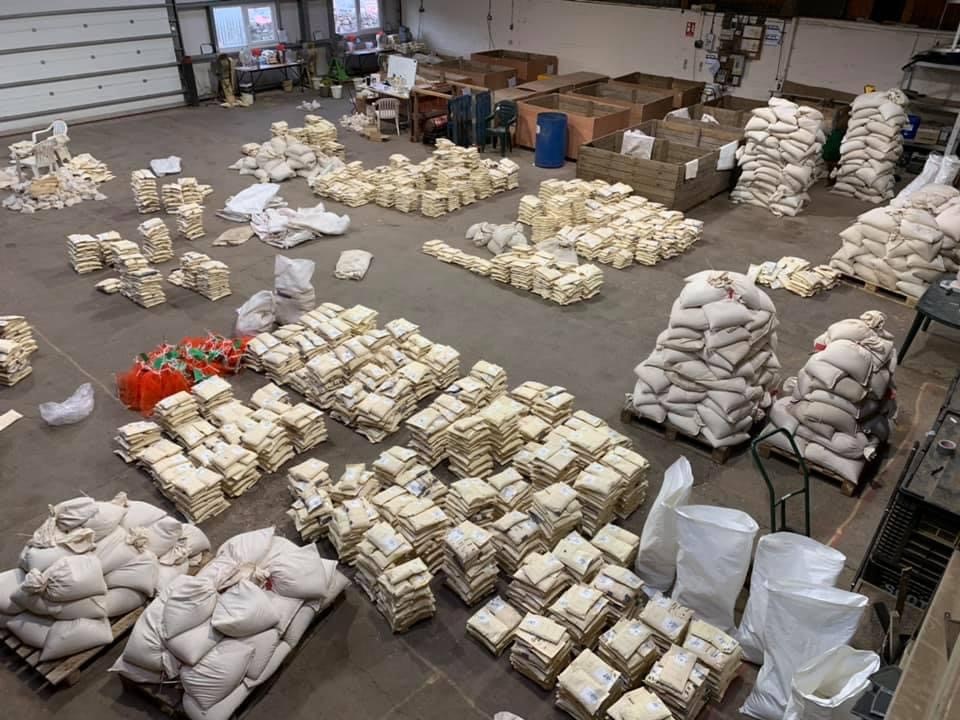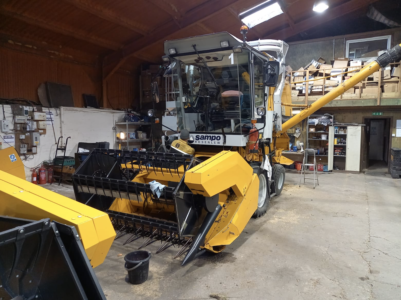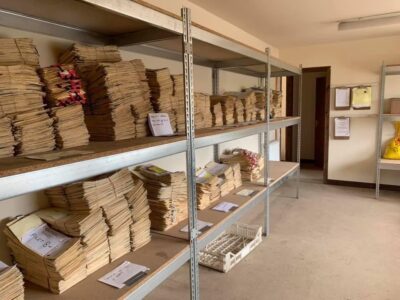
By Sara Sands, Trials Team & Knowledge Transfer Manager
Wintertime may be a quieter time for the trials team, with no late nights on the back of a drill or sitting in a combine, however there is plenty to keep us busy.
Once all plots have been harvested and winter trials sown, we can all take a breath, but work on the thousands of samples now covering the shed floor continues. They might need to be dried, re-bagged or further quality assessments carried out before being stored or sent away. At times, the shed floor may look like an obstacle course of samples, but they are all organised into piles with multiple lists on whiteboards explaining which trial is where and what needs done.
Further assessments on the potato trials are also carried out in the shed. Every trial is graded, and some require skin finish assessments. Concentration is key looking at 400-500 potatoes a day. Once all assessments are complete, reports are finalised and sent to sponsors. The analysis of our own trial results and completion of our results booklet is also carried out at the time, along with preparation for the results meetings for our members.
As well as our own results meetings there is a variety of other meeting and conferences we attend throughout the winter. External conferences run by AHDB or Crop Protection in Northern Britain, industry briefings and trial sponsor planning meetings all take place. This year as everything moved virtually it allowed some of the trials team to join meetings, they previously might not have been able to. Many may be sick of Zoom and it is not the answer for everything, but it certainly has some advantages and opened up new possibilities.
Wintertime also allows repairs and servicing of machinery to take place. We are constantly upgrading and investing in new kit to help with accuracy and efficiency of the trials we produce. Equipment can all be cleaned and calibrated ready for the new year and the shed can also get a spring clean. New additions add to the maintenance workload, but when all working well it is an essential asset.


Training is essential to every work force and the wintertime is the perfect opportunity for this. Spraying, forklift, first aid, trailer tests are just some of the qualifications gained by the trials team. Updating records and ensuring procedures are in place in relation with Health and Safety regulations, risk assessments, Standard Operating Procedures, and the Chemicals Regulation Division which is the regulatory body whose standard we work to, may not be the most exciting of tasks but it is necessary to allow us to carry out trials work.
To ensure the field work can be carried out as efficiently as possible, a huge amount of planning and preparation is required. Roughly 3 days preparation is required for 1 day in the field. The majority of this preparation occurs over the winter, allowing plans to be put in place for the season ahead.
Seed delivery can be a stressful time waiting on varieties to arrive, and the vans tend to turn up late in the day. The majority of the seed needs weighed out into separate envelopes for each individual plot, these are then labelled and set aside until plans for the site have been finalised. Creating plans is a bit like Tetris, making things fit in the field area, trying to group similar trials together to make it as easy as possible for field application to be carried out. These are all doubled checked ready to be used for organising seed. Each envelope of seed will go into a numbered box in the order of the plan so the drill can continually travel up and down the field. On the larger trial sites at Balgonie, 100+ boxes can be used with 24 plots of seed in each making it a military operation to organise and load, keeping everything in order for sowing. The thousands of envelopes which are used for sowing are cleaned and reused for harvest samples, a job that is carried out on rainy days throughout the year.
Spray days can be few and far between in Scotland so ensuring we can be as productive as possible in the field is crucial. Once fungicide protocols have been confirmed we can create spray sheets to be used in the field. These detail exactly the amount of water and product required for each treatment. Colour coded plans help the operator to navigate the trials, ensuring the correct mix is sprayed on the correct plot. These field application sheets are double checked, and chemical looked out so when the weather allows, we can be straight out to the field. With the recent loss of many crop protection products, it might mean there are less products to use, but it has led to us testing some weird and wonderful products. These will continue to grow and hopefully we will come across some positive new discoveries.
Every trial sown has a unique set of assessments and keeping track of them requires a very large excel spreadsheet. Each year this seems to get a little bit bigger and a little more complicated. The trials are listed by crop and each assessment required, whether it’s at application or at a certain growth stage. Throughout the summer this is constantly checked, updated, and next assessment scheduled. Every trial also has a unique file for entering data to allow statical analysis to take place. Taking time to set this all up before the spring madness is vital and ensures nothing is missed and harvest results can be sent to sponsors ASAP.
In recent years we have moved towards a more electronic system for recording data in the field and using tablets for booking in products straight onto the computer system. There is the occasional technical glitch, however it has not only reduced the amount of paper we use but also saves time with entering data onto the computer. Our computer system was put to the test in 2020 with some of the trials team working from home. It might not have always worked perfectly, but it allowed us to complete trials work and start planning for the future season safely from home. Not everything could be carried out from home and procedure were put in place to ensure work out in the field or in the shed was carried out in line with guidelines. COVID provided many obstacles that no one could have predicted but we all adapted to ensure trials work continued.
Jobs in the winter might not be the most exciting at times but they are crucial to ensure the smooth running of the trials operation. With new pieces of kit, systems for working and ideas coming forward our work is constantly changing, but you can never have enough lists or excel spreadsheets to keep things in order.